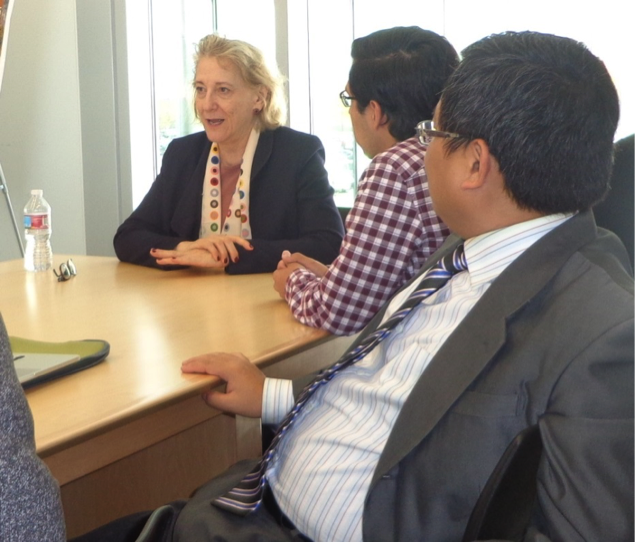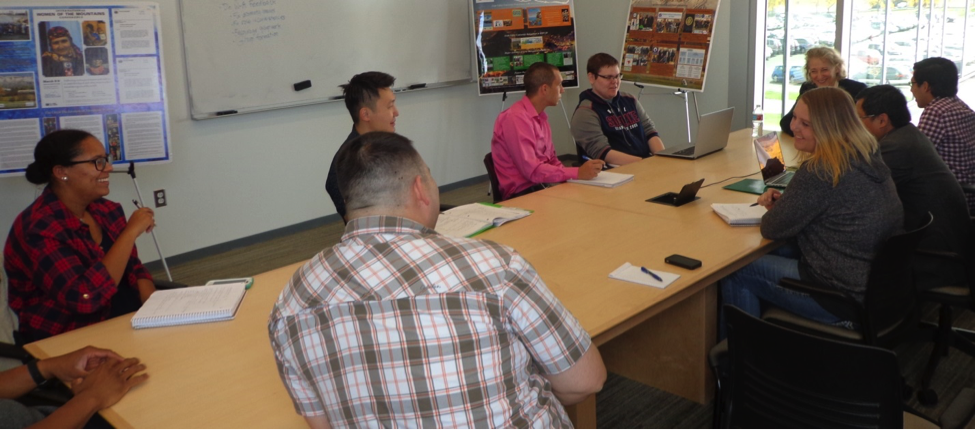Members of the Utah International Mountain Forum (UIMF), a coalition of student clubs at Utah Valley University (UVU) hosted Dr. Tani Barlow, T.T. and W. F. Chao Professor of Asian Studies in the History Department at Rice University and a leading U.S. scholar on Chinese feminism, on October 11, 2016. Our members were interested in building ties with Chinese scholars in gender studies and from the mountain regions in particular in order to invite them to contribute to the future International Women of the Mountains Conferences (WOMCs). As part of student community engaged learning experience, UVU hosted four WOMCs as major grass-roots forum in North America to promote gender and sustainable mountain development (SMD) agendas of the United Nations since 2007.

Professor Tani Barlow in the Meeting With UIMF Members
Professor Barlow spoke about organizations in which she is involved that parallel the goals of fostering relationships and sustainability in the mountainous regions of the world. One of these organizations is Peace Women Across the Globe, which focuses on nominating a collective group of women for the Nobel Peace Prize who are working at the local, national, or international level for peace. Many of these women are farmers in mountainous areas. The ideology behind this organization is that locals can and should make the biggest changes in their community. One of the most striking examples was a woman who created a green tourist industry in the rural Chinese village in which she grew up. The goals of this organization also parallel with the goals of UIMF in bringing women to the table to assist in decision making in society to promote peace.
She also addressed the question of whether or not there is a battle between secular and religious modernization. Interestingly, Professor Barlow does not believe these two things had to be mutually exclusive. Both of us echo Professor Barlow’s assertion that religion can be a positive force in modernization. Of course, there do exist the extreme ideological instances of gross violations of human rights, but they can be protected in multiple ways. Violence against women is a global phenomenon and organizations such as Peace Women Across the Globe tackle this problem in various forms by empowering women at the local level to share their experiences and spread the knowledge of strategies that have worked and may work across interregional boundaries.
Professor Barlow spoke in an earlier lecture about the role of women in advertising. The portrayal of women in advertising goes hand in hand with women’s rights and their place in modernity. For example, in the early 1900’s we saw the emergence of ads that depicted a young man and a young woman shaking hands. That was a practice previously unheard. It was improper even. Men and women did not have physical contact with each other in such a way. Advertising changed that. They depict what it means to be an aspiring woman in modern society.
However, advertising also sexualizes women. Through advertisements women are commodified, they are commodities, and they are in commodities. The modern woman is affected to this day by the way they are portrayed by the media and in advertisements which is part of the commodities that can be bought or sold. For example, women can purchase creams that lighten their skin or bright red nail polish rather than soaking their nails in a red dye. They can purchase commodities for themselves that then make themselves the image of the modern woman as portrayed by the advertisements. Even dating has become a commodity. Based off of the image of the modern man or more often the modern women we create our expectations for what we look for in a potential partner. Nevertheless, there is a shift at least in China where women are choosing careers rather than marriage because the image of the modern woman is a strong and independent figure who cares for and sustains herself. She maintains a professional social and personal life and drives forward innovation and can affect change in both public, national, and international arenas.
During the meeting with UIMF members, Dr. Barlow recommended several individuals who could help further our goal of the UIMF and WOMCs, including Professor Wen Tiejun, Head of the New Rural Reconstruction Movement and Executive Dean of the Institute of Advanced Studies for Sustainability at Renmin University of China. He would be an invaluable resource in promoting the WOMCs and UIMF objectives. His experience with rural Chinese citizens and his “people-centered scientific approach” could be very influential in promoting sustainable development in mountain communities.
Professor Jing Wang was also suggested as someone who had experience related to what we are trying to accomplish. Wang is the founder and director of New Media Action Lab, a program which seeks to help modernize villages and improve literacy of members associated with them.

UVU Students Discussion with Dr. Tani Barlow
Meeting with Dr. Barlow provided UIMF members great incentive and encouragement to continue efforts in building ties between Utah and many mountain communities around the world with focus on promoting gender and family issues as part of overall goals of sustainable mountain development agenda. We thank Dr. Sam Liang, Associate Professor of Philosophy and Dr. Hong Pang, Assistant Professor of History and Political Science, UVU for providing us such a great opportunity to have a special meeting and discussion with Dr. Tani Barlow during her visit to UVU.
Tenika Ray and William Crist, members of the Utah International Mountain Forum, a coalition of student clubs at UVU

